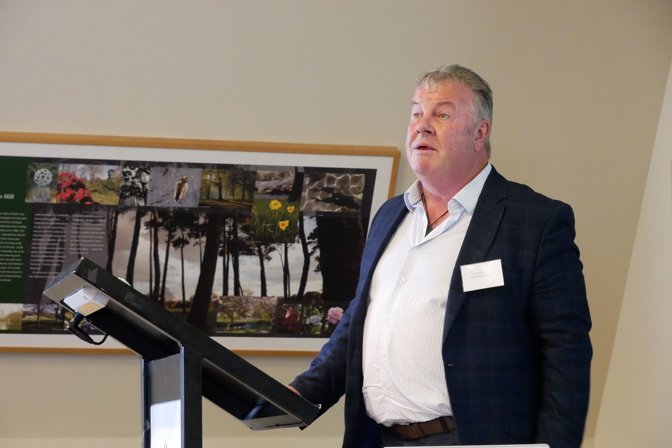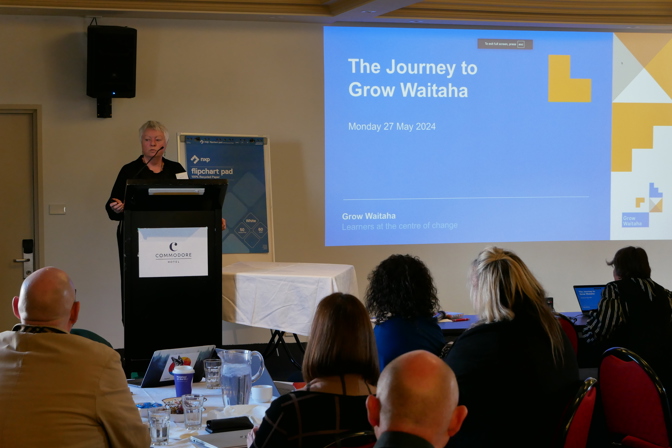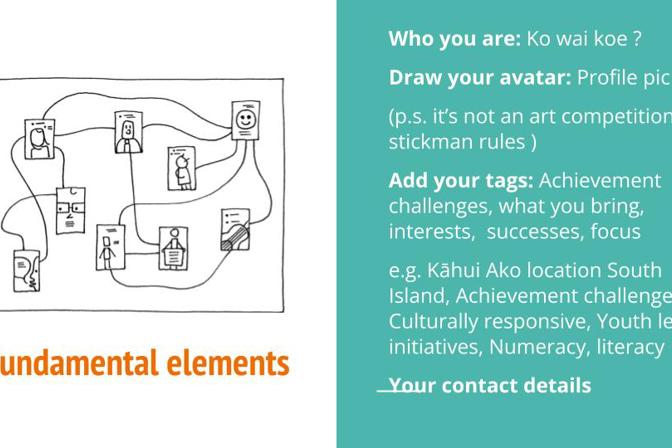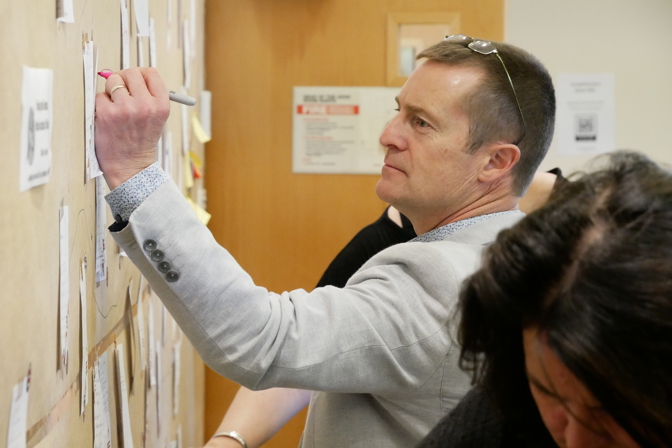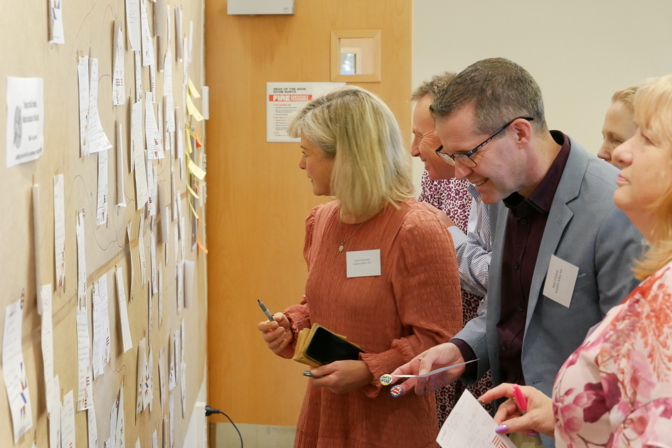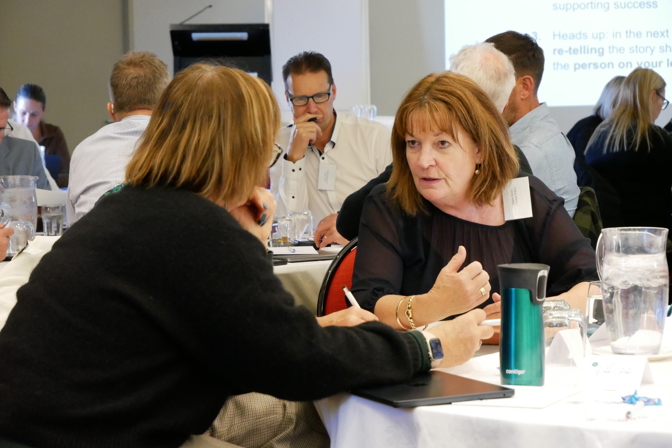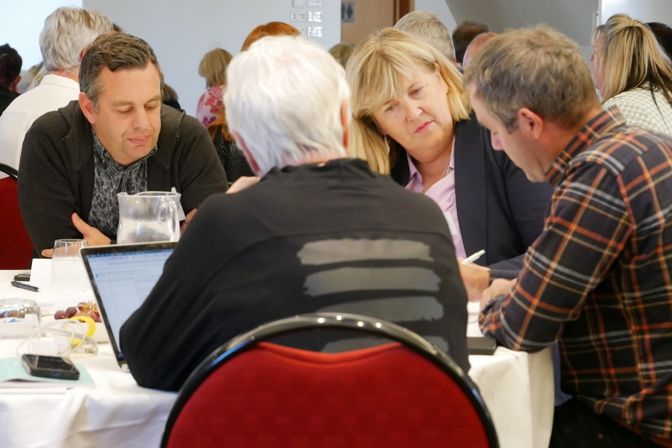Aotearoa National Kāhui Ako Gathering
Recently our Grow Waitaha facilitators Suzi Gould, Cheryl Doig, and Stephen McConnachie supported the first-ever Aotearoa National Kāhui Ako Gathering. In this story, they share the learning and tools, gleaned from the gathering, that leaders can use to boost inclusion and engagement in Kāhui Ako.
Brian Price, lead principal of Puketeraki Kāhui Ako
Dr Cheryl Doig presents at the Aotearoa National Kāhui Ako Gathering
Low tech social networking
Leaders engage in the low tech social networking wall at the Aotearoa National Kāhui Ako Gathering
Leaders engage in the low tech social networking wall at the Aotearoa National Kāhui Ako Gathering
Leaders working together at the Aotearoa National Kāhui Ako Gathering
Leaders working together at the Aotearoa National Kāhui Ako Gathering
Leaders working together at the Aotearoa National Kāhui Ako Gathering
Leaders working together at the Aotearoa National Kāhui Ako Gathering









Understanding the kaupapa of Kāhui Ako
Kāhui Ako (communities of learning) are groups of independent schools and providers that work together to focus on learner pathways. Kāhui Ako collaborate to develop achievement challenges and shared goals that will make the most significant difference for their ākonga.
Source and further reading: Achievement challenges | Ministry of Education
What we might see happening in each Kāhui Ako is different but all Kāhui Ako have one thing in common. They “create the conditions for … collaboration to happen.” (Greany, 2017, p. 63).
Collaboration is neither quick nor easy. Suzi Gould, Grow Waitaha facilitator, says “mapping out your action plan and measuring progress relies on your Kāhui Ako to be quite vulnerable and have high levels of trust with sharing data.” High turnover, resource allocation, or a lack of trust can easily derail the process. Many Kāhui Ako struggle to find the time to connect and commit to action. However, when they do the power of the collective to improve outcomes for ākonga and their whānau is impressive.
How do Kāhui Ako leaders sustain collaborative practice when principals are facing so many challenges and competing demands on their time?
Watch our video about successfully collaborating as a Kāhui Ako.
Supporting leaders through the Grow Waitaha Kāhui Ako network
The Grow Waitaha Kāhui Ako network supports leaders in creating trusting relationships and strong leadership networks to share support, challenges, and evidence-based practices.
The Grow Waitaha Kāhui Ako network was set up in 2019 to support Kāhui Ako leaders in tackling challenges together. The network has connected 29 Kāhui Ako or clusters and connected more than 160 people across Waitaha.
Suzi explained that the Grow Waitaha Kāhui Ako network “breaks down the barriers and extends the Kāhui Ako collaboration outside their own sets of schools”. The Grow Waitaha Kāhui Ako network’s approach “is not to provide answers…we develop liberating structures and make connections for collaboration and sharing across Waitaha. Our go-to is to create spaces and facilitate approaches so they can learn with and from one another.”
In 2024, the network’s goals are to develop and support:
- culturally sustaining practice – Ka Hikitia, Tau Mai Te Reo, and Tapasā
- coherent evidence-informed practice in each Kāhui Ako
- intentional collaboration between Kāhui Ako
These are ambitious goals that require understanding the needs of each Kāhui Ako in the network. “They’re collaborating on moderation of data, sharing kapa haka and te reo cafes, they’re thinking across a learner pathway and including ECE, and building relationships with mana whenua to share expertise across their Kāhui Ako region,” says Suzi.
We are one of the few regions that have a Kāhui Ako network. But what about Kāhui Ako across the motu?
Aotearoa National Kāhui Ako Gathering
Leading a Kāhui Ako can be a lonely business especially when navigating the waves of changes.
After many experiences with the Grow Waitaha Kāhui Ako network, the lead principal of Puketeraki Kāhui Ako, Brian Price, activated a gathering of 60 Kāhui Ako across Aotearoa. He wanted to replicate what Grow Waitaha does and connect Kāhui Ako across the motu.
Our Grow Waitaha facilitators Suzi Gould, Cheryl Doig, and Stephen McConnachie supported the gathering by creating spaces for diverse voices to be heard, and for people to contribute, collaborate, and problem-solve together.
Brian found himself at the centre of change on the last day of the gathering where it was voted and moved that a national association of Kāhui Ako would be established. This is a proud step to strengthen the commitment of this collective.
‘Principals were buzzing from it,’ Suzi says.
Low tech social networking
Whanaungatanga was an essential part of the gathering and was established by co-creating a mural-sized, visual, low-tech social network.
Participants took a card and created avatars, adding tags (such as achievement challenges, interests, successes, focus), and contact details. Cards created a wall-sized mural and then participants were encouraged to find the people they knew and to draw lines to make connections. This continued for two days, resulting in previously undiscovered connections and new friends.
Learn more about low tech social networking on Gamestorming by Dave Gray.
Appreciative interviews
The Grow Waitaha team and Puketeraki ASLs used appreciative interviews to liberate the root causes of success and the insights of impact. Suzi says, “We wanted to help people share their impact stories plus explore and discover the insights for positive change.”
First, in groups of 4, participants took turns interviewing another person about when their Kāhui developed momentum and they were proud of what they accomplished. Then in groups of 8, they retold the story shared.
The stories from across 60 Kāhui Ako created an exciting kete of the assets and conditions that foster success!
Redefining Kāhui Ako
How do we redefine Kāhui Ako for a future that matters?
Dr. Cheryl Doig led with a whakataukī:
Kia whakatōmuri te haere whakamua. I walk backward into the future with my eyes fixed on my past.
By thinking about our past Cheryl guided participants to consider what they want for their Kāhui Ako in 2034 and how they might take action today.
Cheryl shared some futures scenarios to provoke thinking. What if…
- Kāhui Ako were standardised for targets and data gathering?
- AI was a Kāhui Ako co-lead?
- our workforce was hybrid?
- we measured happiness?
- creativity and fun were our chief measures of success?
- we gamified our Kāhui Ako data?
- significant decisions had to go through a panel of ākonga to be approved as a filter for future generations?
- every Kāhui Ako included a Māori full immersion or bilingual pathway?
- half the kaiako in our Kāhui Ako were new to Aotearoa and had no understanding of Te Tiriti or what culturally responsive practice is?
Cheryl was mindful of the need to pace the futures thinking with time for participants to talk/think/imagine. She prompted participants to think about:
- What will our focus be? How will we scan? What’s the one critical next step?
- How will you lead with moral purpose and hope - honouring the past and intentionally influencing the future, today?
What’s next?
The next hui for the Canterbury Kāhui Ako Leadership Network is Wednesday 4th September at the Hornby Club.
- Liz Hill-Taiaroa from Kōia Te Mātauraka will share processes for UKD curriculum design with a te ao Māori lens. Join us for a hands-on workshop and explore resources developed by Kōia Te Mātauraka to support NCEA and years 11–13 ANZH.
- Te Tāhuhu o Mātauranga | Ministry of Education's Lauren Luketina and Emma Royal will share some insights into what makes a good achievement challenge.
- The curriculum lab provides an opportunity to massage your Kāhui Ako/Cluster achievement challenges, curriculum concepts and action plans with the support of expert designers and facilitators. Liz will also be available to support your leaders' learning design expertise.
If your Kāhui Ako or cluster is interested in attending this hui or future events:
- Contact Cheryl Doig c.doig@thinkbeyond.co.nz or Lauren Luketina Lauren.Luketina@education.govt.nz.
- Sign up for the Grow Waitaha newsletter
- Check out our Grow Waitaha events page
Useful links and resources
Low-Tech Social Network – Gamestorming
Canterbury Kāhui Ako Leadership Network – Pathway to success | Grow Waitaha
Ngā Kāhui Ako Communities of learning
Puketeraki Kāhui Ako Collaboration in action
Puketeraki Kāhui Ako Establishment and Leadership
Puketeraki Kāhui Ako Culturally responsive practice
Puketeraki Kāhui Ako The strength of collaboration
Christchurch Catholic Kāhui Ako bridging and celebrating diversity

